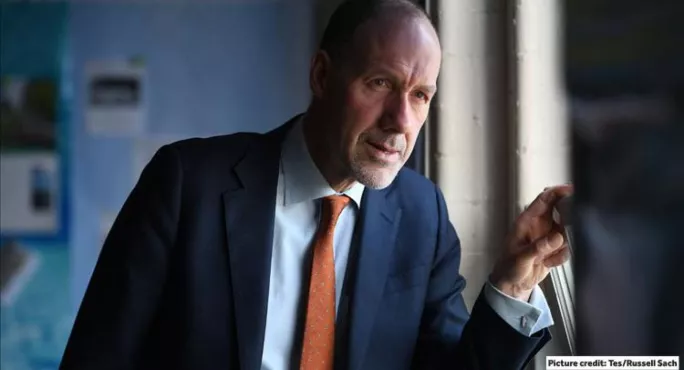
Why Nick Gibb’s parting shots prove we need a change

Now, far be it from me to pick a fight with former schools minister Nick Gibb, but it is hard to read his valedictory address on Conservative Home without a weary sigh.
It is not that I necessarily disagree with all that he says. Far from it. I suspect, for example, that many of us agree that the use of phonics is a key component in teaching children to read.
In fact, the Association of School and College Leaders’ Blueprint for a Fairer Education System makes the point that the phonics check in Year 1 has had a positive impact on the teaching of reading in primary schools, and should be retained.
My weariness comes from the subtext of his blog - his battle against the supposed dark forces of progressive education as he valiantly brandishes the trusty sword of rigour, standards and a knowledge-rich curriculum.
Nick Gibb and the sterile trad vs prog debate
Isn’t it time we moved on from this sterile debate, the increasingly tiresome false dichotomy between clashing mythical forces of progressives and traditionalists?
There may be a few hardy souls in the education sphere who still plant their flag in the progressive camp, and others who may regard themselves as out-and-out traditionalists. However, most of us, when we think of it at all, are probably somewhere in between.
Thus we can agree that every child should have a core educational entitlement, a body of knowledge that equips them for further and higher education, apprenticeships, careers and, indeed, for life.
But we may also worry where this premise has led us when it is translated into policies that feel mechanistic, overbearing and counterproductive.
These are the policies woven into our arcane accountability system that champion traditional academic disciplines to the point at which creative and technical subjects have been driven to the margins of the curriculum.
School leaders desperately try to cling on to subjects like music, drama, dance, and design and technology, despite - rather than because of - the system, driven by their belief in a rich and rounded education.
These are the policies that have seen GCSEs reformed into something akin to old-style O-levels with an emphasis on memorisation and on terminal exams, resulting in the insanity of students sitting more than 30 hours of papers in an average summer series.
GCSEs disadvantage the ‘forgotten third’
Many students, of course, emerge on the other side of all this with a glittering set of qualifications and bright prospects.
These are the most academically able, often from middle-class homes, and with parents who can afford to supplement their in-school education with after-school clubs and extra tuition when needed.
However, it works much less well for a significant proportion of pupils - the group that we refer to as the “forgotten third”.
These are the young people who may struggle more with the emphasis on memorisation and terminal assessment, and who often do not come from middle-class homes and do not have access to the same set of advantages as those that do.
This sort of thinking, of course, invites the familiar charge that I am merely espousing the “soft bigotry of low expectations”. And - bingo! - it is indeed a phrase that is deployed with grinding predictability in Mr Gibb’s blog.
But it is surely not a low expectation to say that it might make more sense to use a wider range of assessment methods in order to allow students to better demonstrate what they know rather than what they don’t know; to use a system more sophisticated than a one-size-fits-all set of pen-and-paper exams more redolent of the 1950s than the 2020s.
Time to act
And if we cannot do this now, when we have a new digital world at our fingertips, and the recent experience of utilising that technology over the past 18 months, when will we do so?
This doesn’t feel like a low expectation at all. It feels like a high expectation, an ambition that all young people can achieve if they are only given a chance to do so.
In his blog, Mr Gibb urges his successors to resist the siren voices of those who call for GCSEs to be abolished.
But this is not a straight choice between keeping GCSEs and scrapping them, another one of those ill-tempered either/or simplifications.
There is surely room for reform to take a qualification designed in a different era and explore how it might work better for all students, for teachers, for employers, for universities.
As we enter a different, post-Covid era, our children and young people - especially those members of the forgotten third - deserve higher expectations.
I hope Mr Gibb’s successors will move on from the language of progressives versus traditionalists, of knowledge versus skills, of them and us. It is a language that increasingly feels like it belongs to a different and receding era.
Geoff Barton is general secretary of the Association of School and College Leaders.
You need a Tes subscription to read this article
Subscribe now to read this article and get other subscriber-only content:
- Unlimited access to all Tes magazine content
- Exclusive subscriber-only stories
- Award-winning email newsletters
- Unlimited access to all Tes magazine content
- Exclusive subscriber-only stories
- Award-winning email newsletters
You need a subscription to read this article
Subscribe now to read this article and get other subscriber-only content, including:
- Unlimited access to all Tes magazine content
- Exclusive subscriber-only stories
- Award-winning email newsletters
- Unlimited access to all Tes magazine content
- Exclusive subscriber-only stories
- Award-winning email newsletters
topics in this article



